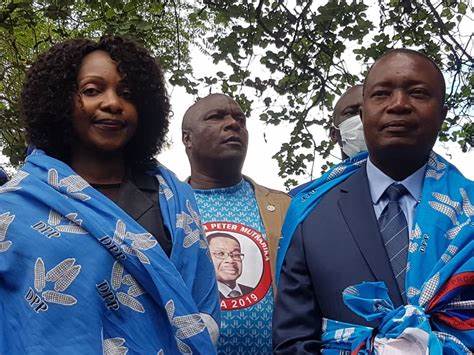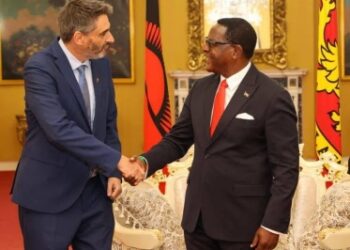In what is emerging as one of the most surprising turns of the 2025 campaign season, UTM leader Dr. Dalitso Kabambe has launched a direct attack on former president and Democratic Progressive Party (DPP) candidate Arthur Peter Mutharika (APM), warning Malawians against voting him back into office in the September 16 election.
Dr. Kabambe, once a senior figure in the DPP before his dramatic shift to UTM, has traditionally avoided attacking his former political home boy directly. But at a campaign rally this week, he accused Mutharika of being a consistently “mediocre” performer in government, citing both his ministerial record and his troubled presidential tenure.
Speaking to supporters in Mulanje, Kabambe reminded Malawians of Mutharika’s role as Education Minister under his late brother, Bingu wa Mutharika, during the academic freedom crisis at the University of Malawi, a saga that left deep scars on the country’s higher education system.
He also pointed to Mutharika’s period as Foreign Affairs Minister, when a diplomatic spat with the United Kingdom escalated to the point where the then British High Commissioner Cochrane Dyet was expelled from Malawi.
Dr. Kabambe said these incidents were evidence enough that Mutharika, now 86, has never demonstrated the capacity to manage complex national affairs.
“He failed before, and he will fail again,” Dr. Kabambe said, drawing sharp applause from his audience.
Dr. Kabambe’s remarks are significant not only for their content but also for their timing and symbolism. Until now, the fiercest critiques of Mutharika’s suitability have come from outside the DPP orbit, mostly from MCP and civil society voices.

Dr. Kabambe, a former technocrat and Reserve Bank governor during the DPP reign, attacking APM’s competence marks a new trajectory in this campaign.
It also exposes the widening cracks within the opposition.
Atupele Muluzi of the United Democratic Front (UDF), who had also teamed up with the DPP during the 2020 elections, has also questioned Mutharika’s physical and mental fitness to contest at his age.
Together, these lines of attack from Dr. Kabambe and Atupele Muluzi raise a fundamental question in the campaign. Is Peter Mutharika fit, politically, physically, and intellectually, to serve as president again?
DPP insiders, reacting furiously to Dr. Kabambe’s comments, described them as “betrayal” and “desperation politics.” According to sources within the party, Kabambe’s attack has cut deeper than other criticisms precisely because it comes from a former insider who once served under Mutharika.
“The fact that Kabambe is saying this makes it more dangerous. He knows the weaknesses of APM from inside the system, and he is weaponising that knowledge to turn voters against us,” one DPP strategist confided.

Indeed, Mutharika’s age and visible frailty have already been the subject of intense debate on the campaign trail. The DPP has responded with orchestrated shows of public strength, parading the former president in markets and city centres, often with supporters ferried in to demonstrate his popularity.
Dr. Kabambe’s comments, however, shift the narrative from optics to track record, making it harder for the DPP to deflect with photo opportunities.
For Dr. Kabambe, the attack may also be a calculated move to sharpen UTM’s identity ahead of the polls. Having defected from the DPP, he has often been accused of carrying the baggage of the very system he now criticises.
By drawing a sharp line between himself and Mutharika, Dr. Kabambe is signaling that UTM represents not just another opposition bloc, but a fundamentally different leadership alternative to the tried, tested and failed DPP.
Observers note that Dr. Kabambe’s criticism could resonate particularly with younger and urban voters who remember the academic freedom crisis and the diplomatic fallout with Britain, both of which painted Mutharika as indecisive and tone-deaf in handling governance challenges.
Dr. Kabambe’s salvo, however, also complicates the opposition landscape.
With Atupele Muluzi and the UDF already raising doubts about Mutharika’s fitness, and Dr. Kabambe questioning his competence, the opposition risks looking divided and disjointed in its messaging. Instead of presenting a unified front, the various opposition blocs appear locked in a bitter struggle over who represents the “real alternative.”
This division could work to MCP’s advantage. President Dr. Lazarus McCarthy Chakwera’s campaign has largely focused on showcasing completed projects and governance reforms.
As the opposition squabbles over Mutharika’s candidacy, the MCP has more room to consolidate support among undecided voters.
Dr. Kabambe’s attack on Peter Mutharika is not just another campaign soundbite, it is a turning point in the 2025 election narrative. It has forced the DPP to face uncomfortable truths about its candidate’s record and fitness for office. It has also laid bare the opposition’s fractured strategy, where instead of rallying behind a common agenda, the blocs are tearing at each other’s weaknesses.
For Malawians, the message is clear. This election is no longer just about party loyalty. It is about leadership competence, fitness for office, and the willingness of candidates to put national interest above personal or factional ambition.







